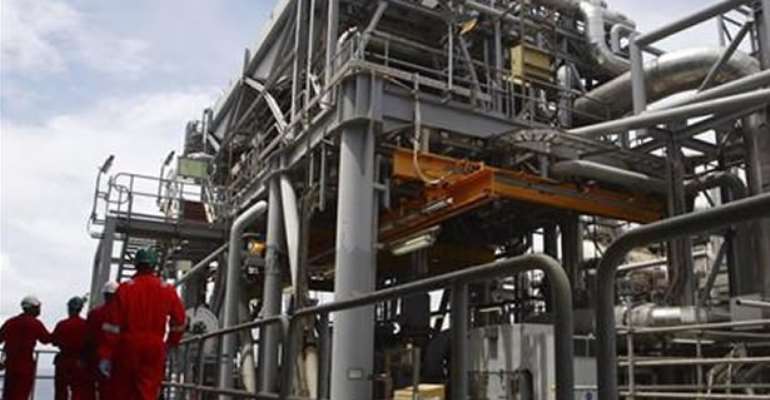Nigeria's Oil Audit Presents Confusing Picture Of A Broken System

Nigeria runs on oil: The government of Africa's largest economy makes three-quarters of its revenue from crude.
The question for Africa's biggest oil producer is, how much of that money makes actually makes it into the government's bank account, without being lost to corruption or mismanagement along the way?
An audit conducted last year and released yesterday was supposed to provide clear answers. Instead, its authors describe a bewildering picture of confusion and obfuscation and, ultimately, raise many new questions.
Nigeria's oil revenue begins its journey into the bank accounts of the government by passing through the Nigerian National Petroleum Corporation, a state-owned oil company. Transparency International once called the NNPC the world's most secretive oil company, though the Berlin-based watchdog now says it's become more open.
Last year, Nigeria's then-central bank chief, Lamido Sanusi, testified that this giant oil company was either losing or stealing some of the money it should have been paying to Nigeria's government. He said it deposited as much as $21 billion less than it should have into government bank accounts between January of 2012 and July 2013.
The NNPC said it spent that money on legitimate expenses. Nigeria's President Goodluck Jonathan, suspended Sanusi, and then ordered what he called a forensic audit of the company to find out where the money went.
Depending on whom you ask, the audit was completed late last year or early this year. The government released a brief statement earlier this year saying, essentially, the audit had shown there was no wrongdoing and that the allegations about the missing money were unfounded. The audit itself, however, remained tightly under wraps. Repeated requests by the Wall Street Journal to see the audit itself after the statement was released were refused.
Yesterday, that audit came out, weeks after Jonathan lost his bid for a second term.
Here are the top takeaways.
First, the authors of the audit admit it is not up to generally accepted auditing standards.
PricewaterhouseCoopers, which conducted the study, said it had difficultly obtaining documents, verifying some of the documents it obtained, and even getting officials to respond to their emails.
“The procedures we performed did not constitute an examination or a review in accordance with generally accepted auditing standards or attestation standards,” the report begins.
In particular, the report singled out the Nigerian Petroleum Development Company. That's a subsidiary of the NNPC that explores for and produces oil along the Nigerian coast. It handled $6.8 billion worth of oil over the 19-month period the audit covered. But NPDC refused to provide a breakdown of how much of that oil it sold to whom, or for how much, the report said.
The auditors asked for the bank account names and numbers where the revenue from those sales is kept. The company did not reply to those requests, the audit says.
Calls by The Wall Street Journal to the subsidiary could not connect.
Second, Nigeria's oil company is struggling to turn a profit.
The NNPC doesn't just sell oil. It also uses the profits to subsidize the cost of kerosene and motor fuel so that Nigeria's population can afford to fill their cars and heat their stoves.
The problem is, the NNPC is seemingly spending so much money subsidizing those products that it's struggling to turn a profit.
Here's how it works: The bulk of the NNPC's money comes from what it calls domestic crude. Every day, it receives about 445,000 barrels of crude oil from the other oil companies that operate in Nigeria. It either refines that crude or trades it for refined products, such as gasoline. Then it uses the proceeds to subsidize the everyday fuels Nigerians use.
This is not sustainable, the report says. The price of oil has collapsed, but the amount the NNPC is spending to subsidize oil isn't falling with it. If something doesn't change, the NNPC will spend all the money it makes from those 445,000 barrels just on subsidies. It will have to take on debt, and won't have any money left over from the domestic crude to give to Nigeria's government.
That's a grave prospect. Nigeria's government says it desperately needs new revenue. Its population is growing by 11,000 people a day, straining roads, ports, schools, healthcare services and power lines, all of which need to be renovated. In the past few months, the central bank has spent billions of dollars trying to keep the currency from collapsing. The country is fighting an expensive war with the insurgency Boko Haram that has already slogged on for six years.
The audit report offers a daunting diagnosis: “The NNPC model of operation must be urgently reviewed and restructured,” it says.
Third, Nigeria's oil company may be selling crude oil for a higher price than it admits.
Auditors said they noticed a trend during their probe: Customers were often buying crude oil for a higher price than the officially quoted price the NNPC reported to government. The inference here is that somebody is pocketing the difference.
When the auditors asked the NNPC for documentation to assess the scale of that problem, they had no luck. “Our request was not granted,” the audit says.
Finally, the numbers don't add up.
In many cases, Nigeria's government's math simply doesn't compute. The audit found what it called “significant discrepancies in data from different sources.” It said Nigeria's government is too dependent on data the NNPC provides, “which may not necessarily be accurate.”
A spokesman for the state oil firm declined to comment. A spokesman for President Jonathan couldn't be reached.
**WSJ
